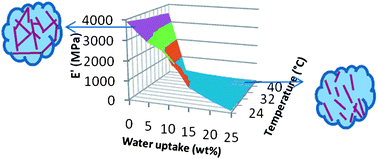A new series of biomimetic, stimuli-responsive nanocomposites, which change their mechanical properties upon exposure to physiological conditions, was investigated. The materials were produced by introducing percolating networks of cellulose whiskers isolated from cotton into poly(vinyl acetate). Below the glass-transition temperature (Tg ∼ 63 °C), the tensile storage moduli (E′) of the dry nanocomposites increased two fold, from 2 GPa for the neat polymer to 4 GPa for a nanocomposite with 16.5% v/v whiskers. The relative reinforcement was more significant above Tg, where E′ was increased nearly 40 fold, from ∼1.2 MPa to ∼45 MPa. Upon exposure to emulated physiological conditions (immersion in artificial cerebrospinal fluid at 37 °C) all nanocomposites showed a pronounced decrease in E′, for example to 5 MPa for the 16.5% v/v whisker nanocomposites with only about 28% w/w swelling. This is a significant reduction in the amount of swelling required to decrease the E′, compared to earlier material versions based on cellulose whiskers with higher surface charge density; the decreased swelling may be a considerable advantage for the intended use of these materials as adaptive substrates for intracortical electrodes and other biomedical applications.

